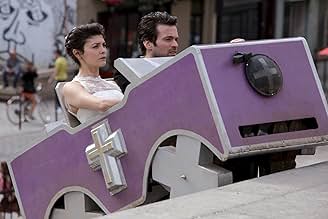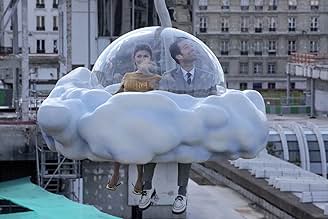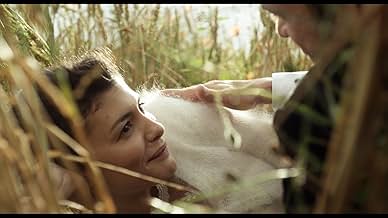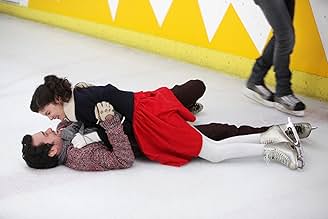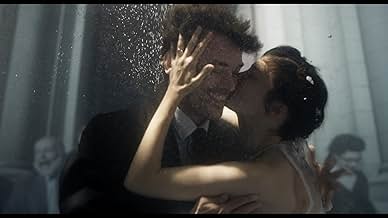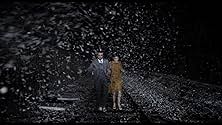NOTE IMDb
6,5/10
17 k
MA NOTE
Colin, jeune célibataire fortuné et inventif tente de trouver un remède pour sa petite-amie Chloé dont la maladie inhabituelle est provoquée par une fleur qui grandit dans ses poumons.Colin, jeune célibataire fortuné et inventif tente de trouver un remède pour sa petite-amie Chloé dont la maladie inhabituelle est provoquée par une fleur qui grandit dans ses poumons.Colin, jeune célibataire fortuné et inventif tente de trouver un remède pour sa petite-amie Chloé dont la maladie inhabituelle est provoquée par une fleur qui grandit dans ses poumons.
- Réalisation
- Scénario
- Casting principal
- Récompenses
- 1 victoire et 10 nominations au total
Aïssa Maïga
- Alise
- (as Aïssa Maiga)
Laurent Lafitte
- Le directeur de société
- (as Laurent Lafitte de la comédie française)
Mathieu Paulus
- Le Chuiche
- (as Matthieu Paulus)
Frédéric Saurel
- Le Bedon
- (as Fred Saurel)
Alex Raul Barrios
- Jésus
- (as Alex Barrios)
Avis à la une
It's been a long time since I've been acquainted with Michel Gondry. Eternal Sunshine of the Spotless Mind and The Science of Sleep are two of my all-time favourite films. Be Kind Rewind was an unfortunate misfire but I already warmly welcome his style. However, I've never seen him quite so unrestrained like this. Mood Indigo is a truly fantasy world. No dream, no drugs, and nothing is how you'd expect. Not even dancing, not even a handshake. To say the world of Mood Indigo is surreal and absurd is an understatement and no words can quite grasp the chaos on screen. It's like an R-rated Dr. Seuss. Like Gilliam's Brazil. But, it's an absolute delight. Things may not make sense at any point, but it's not about symbolism, it's about expressionism. The characters are deeply human, and that's what counts. All these inventions, twists, obscurities all about emotion. And Mood Indigo constantly had me bellying with laughter or sinking an anchor in my stomach when tragedy strikes even when I wasn't sure what was happening.
That's the spirit of filmmaking really, to feel how the characters are feeling, and this film achieves it admirably. But at times it is so dense that its hard to keep up. The special effects and production design are wonderful, but the way it's shot in HD does sometimes nullify its effects and brings us back to reality in a way it doesn't want (I would've preferred Gondry to not have his cameo). Sometimes the cast can't even keep up with it. I really wasn't sure about the cast at first. They're familiar faces, but they didn't seem to suit the tone, plus they felt too old. However, with the film's dark twist in the second half, so dark the film turns black and white, it did become apparent that these cast members fit this melancholic side of the world. I wish it wasn't so bloated in characters and was more restrained like The Science of Sleep. The great soundtrack definitely adds to its rich atmosphere too. I do hope this film will stick with me like his two best films. It may be manic, but it's thoroughly charming. Not Gondry's best but his best in a long while.
8/10
That's the spirit of filmmaking really, to feel how the characters are feeling, and this film achieves it admirably. But at times it is so dense that its hard to keep up. The special effects and production design are wonderful, but the way it's shot in HD does sometimes nullify its effects and brings us back to reality in a way it doesn't want (I would've preferred Gondry to not have his cameo). Sometimes the cast can't even keep up with it. I really wasn't sure about the cast at first. They're familiar faces, but they didn't seem to suit the tone, plus they felt too old. However, with the film's dark twist in the second half, so dark the film turns black and white, it did become apparent that these cast members fit this melancholic side of the world. I wish it wasn't so bloated in characters and was more restrained like The Science of Sleep. The great soundtrack definitely adds to its rich atmosphere too. I do hope this film will stick with me like his two best films. It may be manic, but it's thoroughly charming. Not Gondry's best but his best in a long while.
8/10
Usually, I do not care about how a book is adapted, as long as the movie is good on its own. In that case it was completely different; I am a huge, massive Boris Vian fan, and I never thought his style (for example the way he took metaphors literally) could be set upon a screen.
That is to say, until I've heard that Gondry was directing L'écume des Jours. Sometimes, those things just make sense; Gondry is the only one who could have transformed Boris Vian into something visual, and that is exactly what he did, and with no CGI, only old fashioned tricks. The DIY way ladies and gentlemen, that's what it is all about.
Maybe many will dislike this movie. Others, like me, will love it passionately, for its effusiveness, for its communicative joy, for its unrelenting sadness. But at least, people will feel what Boris Vian is all about. And I mean especially for the English speaking countries, where Boris Vian is really not well known and most of the time poorly translated: by transcribing his style to a visual dimension, Gondry made it universal.
That is to say, until I've heard that Gondry was directing L'écume des Jours. Sometimes, those things just make sense; Gondry is the only one who could have transformed Boris Vian into something visual, and that is exactly what he did, and with no CGI, only old fashioned tricks. The DIY way ladies and gentlemen, that's what it is all about.
Maybe many will dislike this movie. Others, like me, will love it passionately, for its effusiveness, for its communicative joy, for its unrelenting sadness. But at least, people will feel what Boris Vian is all about. And I mean especially for the English speaking countries, where Boris Vian is really not well known and most of the time poorly translated: by transcribing his style to a visual dimension, Gondry made it universal.
I went in to the theater without checking out the reviews beforehand, completely open-minded. I was drawn in by the word "surrealist" in the description, and curious to see whether the movie was going to compare with the early day movies like the 1902 A Trip to the Moon. This was when the totally new possibilities of film were being enthusiastically embraced, and for those long-gone creators the sky was the limit. I wasn't disappointed. It is fabulous how the director has created the most absurd situations and effects, giving the viewer the feeling of bouncing from one surrealist painting into another. It looks like a movie which must have been incredibly time-consuming to bring together, and in my mind Michel Gondry has totally succeeded. Bravo also to Marie-Charlotte Moreau, for her wonderful editing to bring about this beautiful result.
Mood Indigo is an interesting film based off the novel by French author, Boris Vian. With Michel Gondry's sharp direction, a tone of satire and some funny moments, Mood Indigo should really work. However, watching the film all the way through, I can't help but wonder if the movie would have been better had it not featured so many random and nonsensical scenes that overall didn't do anything for the picture. Mood Indigo is an unusual movie that fits Gondry's style (eg. Eternal Sunshine of the Spotless Mind), and from a filmmaking standpoint, it is fascinating to watch.
The film is set in a surreal Paris, and tells the story of a wealthy bachelor named Colin (played by Romain Duris), who spends his time developing a cocktail-making piano known as a pianocktail (not the most subtle of names), and devouring strange moving dishes prepared by his chef, Nicolas (played by Omar Sy). Colin learns that his best friend, Chick (Gad Elmaleh), who is a fellow assistant of philosopher, Jean-Sol Partre (played by Philippe Torreton), has a new American girlfriend (played by Aissa Maiga, who is actually a Senegal born French actress doing an admirable job pretending that her French accent is low), and so he decides to attend a party in hopes that he may find someone for himself. There he meets Chloe (played by Audrey Tautou) and the two fall in love. Eventually an illness comes over Chloe, one very strange illness, as a flower begins to grow in her lungs. The only way Colin can save her, is to supply her with an endless amount of fresh flowers.
The opening of Mood Indigo introduces us to what most of the film's tone will be as we are treated to a variety of things happening: people using typewriters in a room; then we cut to a man getting out of a bathtub; we see a rat, who is just a small guy in a rat suit etc. Every single thing we see in the introduction relates in some way to some form of technology. The film seems to have a fascination with using technology in weird and unusual ways. I haven't read the book it's based off of, but from what I've heard, it also conveys unusual and bizarre things in it. This makes it interesting to watch, but I couldn't possibly imagine few directors, other than Gondry, making this film work in any way, even if it ultimately makes little sense. Among the things that I find fascinating and weird at the same time in the film include: throughout the film when objects are thrown and touched, multiple versions of them appear suddenly out of the blue; during the dance, the entire background of the area is blue; the ringer in Colin's room is treated like a bug, and falls apart into little tiny robotic bugs anytime it makes a sound; the two couples, Chick and Alise, and Colin and Chloe (who are getting married), ride in small cars throughout the building in order to get to the wedding; and a man gets in a rocket suit with wings of sorts and goes into the sky, only for him to eventually fall back into the sky, among others.
Much like most of Gondry's films including The Silence of The Sleep and Eternal Spotlight of The Sunshine Mind, this film is more about the fantastical elements, than it is about the actual performances. That said, this film features a fine cast, and most of the actors, including Romain Duris, Audrey Tautou, and Omar Sy, are giving good performances. There are many things in this film that are honestly not needed, such as the small man in the rat suit, and the bird human lady at the ice rink. Some of these elements serve the story no purpose and are just there to give the film an even weirder feeling.
About an hour within the film, it takes a tonal shift and becomes more depressing as the wife become sick. This shift comes out of the nowhere, but given the story, it actually works. The lack of technology makes this apparent, as Gondry makes the film's tone bleaker and depressing, with Chloe just about dying. By the end of the film, everything is in black and white, which is done to represent Colin's loss of faith and feelings. One scene in particular, features a nice dangerous bit of music, as Colin chases his shadow down the road back home.
Aside from a few scenes, this film is never really boring. I can't really recommend this film for the average moviegoer, but any film geek, like myself, would probably find it fascinating, even if the film inconsistent in some regards.
The film is set in a surreal Paris, and tells the story of a wealthy bachelor named Colin (played by Romain Duris), who spends his time developing a cocktail-making piano known as a pianocktail (not the most subtle of names), and devouring strange moving dishes prepared by his chef, Nicolas (played by Omar Sy). Colin learns that his best friend, Chick (Gad Elmaleh), who is a fellow assistant of philosopher, Jean-Sol Partre (played by Philippe Torreton), has a new American girlfriend (played by Aissa Maiga, who is actually a Senegal born French actress doing an admirable job pretending that her French accent is low), and so he decides to attend a party in hopes that he may find someone for himself. There he meets Chloe (played by Audrey Tautou) and the two fall in love. Eventually an illness comes over Chloe, one very strange illness, as a flower begins to grow in her lungs. The only way Colin can save her, is to supply her with an endless amount of fresh flowers.
The opening of Mood Indigo introduces us to what most of the film's tone will be as we are treated to a variety of things happening: people using typewriters in a room; then we cut to a man getting out of a bathtub; we see a rat, who is just a small guy in a rat suit etc. Every single thing we see in the introduction relates in some way to some form of technology. The film seems to have a fascination with using technology in weird and unusual ways. I haven't read the book it's based off of, but from what I've heard, it also conveys unusual and bizarre things in it. This makes it interesting to watch, but I couldn't possibly imagine few directors, other than Gondry, making this film work in any way, even if it ultimately makes little sense. Among the things that I find fascinating and weird at the same time in the film include: throughout the film when objects are thrown and touched, multiple versions of them appear suddenly out of the blue; during the dance, the entire background of the area is blue; the ringer in Colin's room is treated like a bug, and falls apart into little tiny robotic bugs anytime it makes a sound; the two couples, Chick and Alise, and Colin and Chloe (who are getting married), ride in small cars throughout the building in order to get to the wedding; and a man gets in a rocket suit with wings of sorts and goes into the sky, only for him to eventually fall back into the sky, among others.
Much like most of Gondry's films including The Silence of The Sleep and Eternal Spotlight of The Sunshine Mind, this film is more about the fantastical elements, than it is about the actual performances. That said, this film features a fine cast, and most of the actors, including Romain Duris, Audrey Tautou, and Omar Sy, are giving good performances. There are many things in this film that are honestly not needed, such as the small man in the rat suit, and the bird human lady at the ice rink. Some of these elements serve the story no purpose and are just there to give the film an even weirder feeling.
About an hour within the film, it takes a tonal shift and becomes more depressing as the wife become sick. This shift comes out of the nowhere, but given the story, it actually works. The lack of technology makes this apparent, as Gondry makes the film's tone bleaker and depressing, with Chloe just about dying. By the end of the film, everything is in black and white, which is done to represent Colin's loss of faith and feelings. One scene in particular, features a nice dangerous bit of music, as Colin chases his shadow down the road back home.
Aside from a few scenes, this film is never really boring. I can't really recommend this film for the average moviegoer, but any film geek, like myself, would probably find it fascinating, even if the film inconsistent in some regards.
This film tells the story of a young man who lives a great life in his fantastic apartment in Paris. He meets a girl and fall in love, and his life is not the same again.
The film starts off great, with the signature Michel Gondry style of bizarre visual feast. I really like the clash of old and new technology, such as typing into a computer where there are tall people at the other end to process the command. It's imaginative and fun to watch. After an hour of visual feasts, we get to the main advertised plot. The film is not the same anymore, as it moves into a sombre direction. Then the plot derails into a fragmented mess, and I didn't quite know what the plot is really about. Overall, I wish the film was shorter as it really didn't need that much time to tell this story.
The film starts off great, with the signature Michel Gondry style of bizarre visual feast. I really like the clash of old and new technology, such as typing into a computer where there are tall people at the other end to process the command. It's imaginative and fun to watch. After an hour of visual feasts, we get to the main advertised plot. The film is not the same anymore, as it moves into a sombre direction. Then the plot derails into a fragmented mess, and I didn't quite know what the plot is really about. Overall, I wish the film was shorter as it really didn't need that much time to tell this story.
Le saviez-vous
- AnecdotesThe original French title for this movie, L'écume des jours, translates literally to "the foam of the days" but more colloquially means "the froth" or "the remnants" of daydreams. The English-language title, Mood Indigo, is the title of a 1930 jazz composition by Duke Ellington, the musician who is often mentioned in this movie.
- GaffesWhen Nicolas brings breakfast to Chloé and Colin the first time, the long shot from the back of the bedroom shows him entering the bedroom but there are no people up on the bed. The close shot from the end of the bed shows Chloé and Colin receiving the tray.
- Crédits fousThe end credits start on a background of footage of Duke Ellington playing the piano.
- Versions alternativesA shorter version than the 135 minutes original cut has been released in some countries, included France. This alternate version is 36 minutes shorter, and has been edited by Tariq Anwar and supervised by Michel Gondry.
- Bandes originalesTake the 'A' Train
Written by Billy Strayhorn
Performed by Duke Ellington Orchestra (as Duke Ellington and his famous orchestra)
Meilleurs choix
Connectez-vous pour évaluer et suivre la liste de favoris afin de recevoir des recommandations personnalisées
- How long is Mood Indigo?Alimenté par Alexa
Détails
- Date de sortie
- Pays d’origine
- Sites officiels
- Langues
- Aussi connu sous le nom de
- Mood Indigo
- Lieux de tournage
- Sociétés de production
- Voir plus de crédits d'entreprise sur IMDbPro
Box-office
- Budget
- 19 000 000 € (estimé)
- Montant brut aux États-Unis et au Canada
- 303 187 $US
- Week-end de sortie aux États-Unis et au Canada
- 26 511 $US
- 20 juil. 2014
- Montant brut mondial
- 10 435 322 $US
- Durée2 heures 11 minutes
- Couleur
- Mixage
- Rapport de forme
- 1.85 : 1
Contribuer à cette page
Suggérer une modification ou ajouter du contenu manquant

Lacune principale
By what name was L'Écume des jours (2013) officially released in India in English?
Répondre






